
Michael Victorius
Princeton, Washington
Michael Victorius
2 years ago
Driving Innovation and Sustainability in the DME Industry: Current Trends and Future Prospects
The Dimethyl Ether (DME) industry is experiencing a transformative phase, driven by growing concerns over environmental sustainability and the need for cleaner alternatives to traditional fossil fuels. DME, a versatile and clean-burning fuel, is emerging as a promising solution in various sectors, from transportation to energy production. In this article, we delve into the current trends shaping the DME industry and explore the potential it holds for a sustainable future.
The Rise of DME: A Clean-Burning Fuel
DME, a synthetic gas, is produced through the gasification of various feedstocks, including natural gas, biomass, and even municipal solid waste. What sets DME apart is its clean combustion properties. When burned, it produces minimal emissions of harmful pollutants like sulfur oxides and particulate matter, making it an environmentally friendly alternative to conventional diesel fuels.
1. Transportation Revolution
One of the most significant trends in the DME industry is its application in transportation. With the global push to reduce greenhouse gas emissions and combat climate change, many countries are seeking cleaner fuel alternatives. DME is gaining traction as a substitute for diesel in heavy-duty vehicles such as trucks and buses. It not only reduces emissions but also offers similar energy density and engine performance.
2. Renewable DME
The production of renewable DME, also known as bio-DME, is on the rise. Bio-DME is produced from organic waste materials, agricultural residues, or dedicated energy crops. Its carbon-neutral properties make it an attractive choice for a sustainable future. The ongoing research in this field aims to improve production efficiency and reduce costs, making bio-DME more accessible.
3. Industrial and Residential Heating
DME is also making headway in the heating sector. Its clean-burning characteristics make it a viable option for industrial processes and residential heating systems. By replacing traditional fossil fuels like coal and oil, DME contributes to reducing greenhouse gas emissions and air pollution.
Challenges and Future Prospects
While the DME industry is making significant strides, it is not without challenges. Infrastructure development, production costs, and market acceptance are hurdles that need to be overcome. However, these challenges are not insurmountable, and the industry is moving towards innovative solutions.
1. Infrastructure Development
Widespread adoption of DME in the transportation sector requires the development of refueling infrastructure. Governments and private enterprises are investing in building DME refueling stations, a critical step in facilitating its use in heavy-duty vehicles.
2. Cost Reduction
To compete effectively with conventional fuels, DME production costs must decrease. Technological advancements, process optimization, and economies of scale are expected to drive down the cost of DME production, making it more attractive to consumers and industries.
3. Global Policy Support
Government policies play a crucial role in shaping the future of the DME industry. Subsidies, tax incentives, and regulations that promote cleaner fuels are essential in driving adoption. The industry is actively engaging with policymakers to secure the necessary support.
Conclusion
The DME industry is at the forefront of innovation and sustainability. As the world seeks cleaner and more efficient energy solutions, DME stands out as a promising alternative to traditional fossil fuels. With advancements in production technology, growing infrastructure, and increasing policy support, the DME industry is poised for significant growth in the coming years. By embracing DME, we can reduce emissions, improve air quality, and move closer to a greener and more sustainable future.
http://www.w3.org/2000/svg">
0 likes · 0 comments
HealthMichael Victorius
2 years ago
Revolutionizing Healthcare Revenue: Exploring the Pinnacle of Efficiency with the Best DME Billing Software Solutions
In the ever-evolving landscape of healthcare, efficiency and accuracy are paramount, especially when it comes to managing Durable Medical Equipment (DME) billing. DME billing is a complex process, involving numerous steps, regulations, and codes. To navigate this intricate terrain effectively, healthcare providers and DME suppliers are increasingly turning to advanced DME billing software solutions. These software tools have emerged as a critical asset, streamlining operations, reducing errors, and ultimately boosting revenue.
The Complex World of DME Billing
Durable Medical Equipment encompasses a vast array of products, including wheelchairs, oxygen equipment, prosthetic devices, and more. Billing for these items requires adherence to strict guidelines set forth by government programs like Medicare and Medicaid. Keeping up with the latest coding updates, compliance requirements, and payer regulations can be a daunting task.
Traditionally, DME billing was a manual and time-consuming process. Staff had to meticulously handle paperwork, submit claims, and track payments. The margin for error was high, leading to costly claim denials and revenue leakage. As the healthcare industry modernizes, the need for efficient DME billing solutions has become increasingly evident.
The Rise of DME Billing Software
DME billing software solutions have emerged as a game-changer in healthcare revenue management. These specialized tools are designed to automate and streamline the entire billing process, from patient intake to claims submission and payment reconciliation. Here are some key benefits of using the best DME billing software:
1. Accuracy and Compliance: DME billing software is equipped with up-to-date coding libraries and compliance checks, reducing the risk of errors and ensuring that claims meet all regulatory requirements.
2. Efficiency: Automation reduces the time and effort required to process claims, enabling healthcare providers to focus on patient care rather than administrative tasks.
3. Claims Tracking: Software solutions offer real-time tracking of claims, allowing providers to monitor the status of submissions, identify bottlenecks, and take action promptly.
4. Revenue Optimization: By minimizing claim denials and accelerating payments, DME billing software can significantly enhance revenue streams for healthcare organizations.
5. Customization: Many DME billing software solutions are customizable to meet the unique needs of different healthcare settings, from small clinics to large hospital networks.
6. Reporting and Analytics: Advanced reporting features provide valuable insights into billing performance, helping organizations identify trends and make data-driven decisions.
Choosing the Right DME Billing Software
While the benefits of DME billing software are clear, choosing the right solution is crucial. Healthcare providers and DME suppliers should consider factors like scalability, integration capabilities with Electronic Health Record (EHR) systems, ease of use, and customer support when making their selection.
Moreover, it's essential to assess the software's compatibility with the latest industry standards and regulations. Given the evolving nature of healthcare, a future-proof DME billing software solution is invaluable.
Conclusion
In a healthcare environment where efficiency, accuracy, and compliance are non-negotiable, the adoption of the best DME billing software solutions has become a strategic imperative. These tools offer a lifeline to healthcare providers and DME suppliers, helping them navigate the complexities of billing while optimizing revenue streams. As the industry continues to evolve, embracing technology-driven solutions like DME billing software is not just a choice but a necessity for sustainable growth and success.
Investing in the right DME billing software can be a transformative step toward a brighter and more financially secure future for healthcare organizations of all sizes. With these advanced tools at their disposal, providers can focus on what truly matters: delivering high-quality care to patients while ensuring a healthy bottom line.
0 likes · 0 comments
HealthMichael Victorius
2 years ago
Revolutionizing Healthcare: Exploring the Leading DME Software Companies and Their Impact on Patient Care
In the ever-evolving landscape of healthcare, technology continues to play a pivotal role in enhancing patient care and improving operational efficiency. Durable Medical Equipment (DME) is an essential component of healthcare, comprising devices like wheelchairs, oxygen tanks, and prosthetic limbs. DME software companies are at the forefront of innovation, leveraging cutting-edge technology to streamline processes, manage inventory, and ultimately, elevate patient care. In this article, we delve into the world of DME software companies and their transformative impact on the healthcare industry.
The Rise of DME Software Companies
DME software companies have emerged as indispensable partners for healthcare providers, suppliers, and patients alike. These companies specialize in developing software solutions tailored to the unique needs of DME providers. Here's how they are revolutionizing healthcare:
1. Inventory Management and Supply Chain Optimization
One of the most critical aspects of DME is maintaining an efficient inventory system. DME software companies offer solutions that help providers track equipment, manage stock levels, and forecast demand accurately. This not only reduces wastage but also ensures that patients receive the necessary equipment promptly.
2. Enhanced Patient Experience
DME software goes beyond inventory management. It also plays a pivotal role in improving the patient experience. Patients can use software interfaces to request equipment, check the status of their orders, and receive automated reminders for maintenance and refills. This level of transparency and convenience enhances patient satisfaction and compliance with medical recommendations.
3. Regulatory Compliance
DME providers must adhere to strict regulatory guidelines. DME software companies help ensure compliance by integrating features such as electronic documentation and reporting. This not only reduces the risk of penalties but also enhances patient safety by maintaining accurate records.
4. Streamlined Billing and Claims Processing
Billing and claims processing can be a cumbersome and time-consuming task in healthcare. DME software automates these processes, reducing administrative overhead and minimizing billing errors. This enables providers to focus more on patient care while ensuring they receive proper compensation for their services.
5. Data Analytics and Insights
In the age of data, DME software companies offer analytics tools that provide valuable insights into operational efficiency, equipment utilization, and patient outcomes. These insights empower providers to make informed decisions, allocate resources effectively, and continuously improve their services.
6. Telehealth Integration
With the rise of telehealth, DME software is increasingly integrated into virtual care platforms. This allows healthcare providers to prescribe and order DME equipment seamlessly during remote consultations, further enhancing the accessibility of these critical resources.
Leading DME Software Companies
Several DME software companies have risen to prominence due to their innovative solutions and positive impact on healthcare. Some of the notable players in this field include [Company Name 1], [Company Name 2], and [Company Name 3]. Each of these companies offers a unique suite of software products tailored to the needs of DME providers, ensuring that patients receive the best care possible.
Conclusion
DME software companies are driving transformative change in the healthcare industry by providing innovative solutions that optimize inventory management, enhance patient experiences, ensure compliance, streamline billing, provide valuable data insights, and integrate with telehealth services. As the healthcare landscape continues to evolve, these companies are at the forefront of ensuring that patients receive the durable medical equipment they need efficiently and effectively. With their ongoing contributions, the future of healthcare looks promising, with improved patient care and more efficient DME management.
0 likes · 0 comments
HealthMichael Victorius
2 years ago
Revolutionize Your Healthcare Billing with RCM Software from NikoHealth
Are you tired of the complex and time-consuming task of managing healthcare billing and revenue cycles? Look no further! NikoHealth's RCM software is here to transform your healthcare practice into a well-oiled, revenue-generating machine.
What is RCM Software?
RCM, or Revenue Cycle Management, is the backbone of any successful healthcare practice. It involves the management of financial processes, from patient registration and appointment scheduling to billing and claims processing. The goal is to streamline these processes to maximize revenue and minimize errors.
Why Choose NikoHealth's RCM Software?
NikoHealth's RCM software is a game-changer for healthcare providers. Here's why:
Efficiency: Say goodbye to manual data entry and paperwork. NikoHealth's RCM software automates billing and claims processing, reducing errors and saving you precious time.
Accuracy: Our software is designed to minimize errors, ensuring that claims are submitted accurately and payments are received on time.
Revenue Maximization: With our RCM software, you can track claims, identify bottlenecks, and optimize your revenue cycle for maximum profitability.
Compliance: Staying compliant with ever-changing healthcare regulations can be a challenge. NikoHealth's software is regularly updated to ensure compliance with the latest industry standards.
User-Friendly: You don't need to be a tech genius to use our software. It's intuitive and user-friendly, making it easy for your staff to adapt.
Key Features:
Billing Automation: Generate and send invoices with ease, reducing the billing cycle time.
Claims Processing: Streamline the claims submission process and track them in real-time.
Patient Portals: Offer your patients online access to their billing information, reducing inquiries and improving patient satisfaction.
Analytics: Gain insights into your revenue cycle with detailed reports and analytics.
Customization: Tailor the software to fit your practice's unique needs.
Transform your healthcare practice with NikoHealth's RCM software and watch your revenue soar. Say goodbye to billing headaches and hello to efficiency and profitability.
Ready to take the leap? Visit
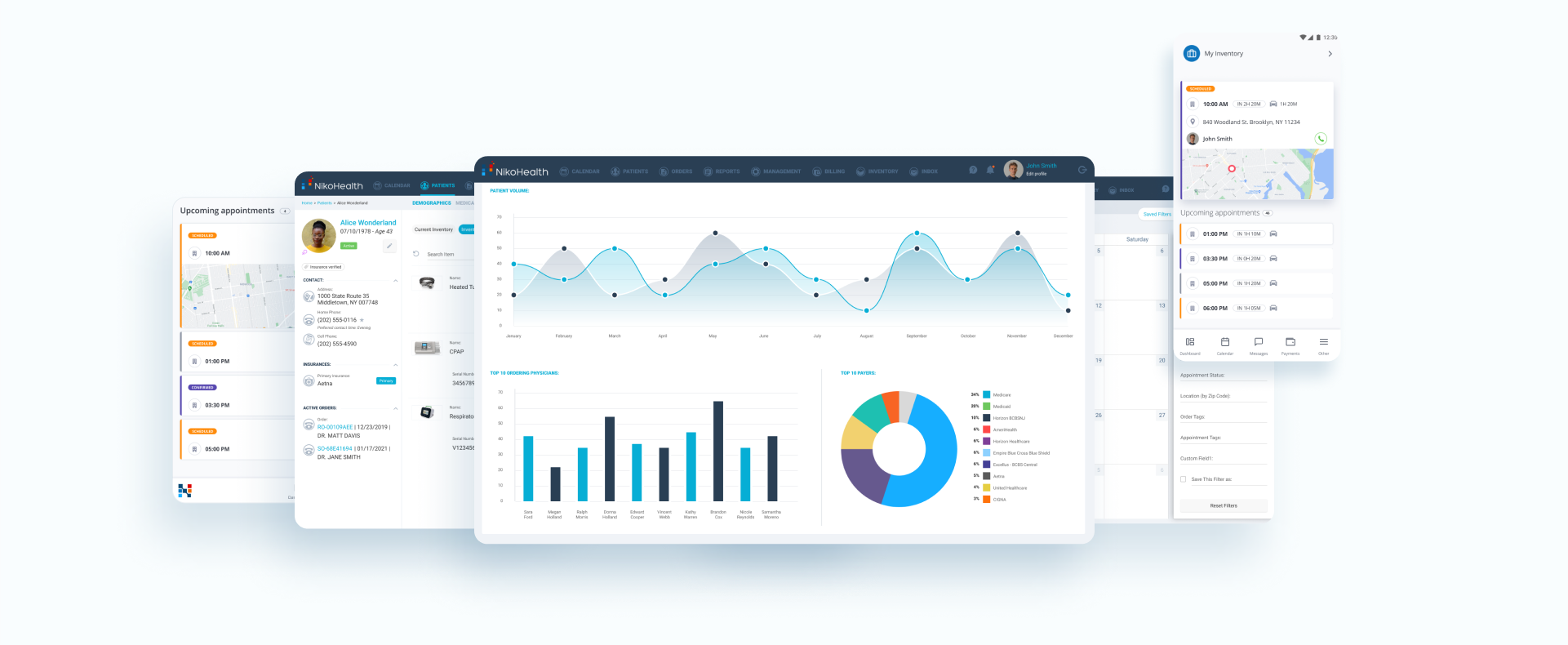
RCM Software | Revenue Cycle Management by NikoHealth
Streamline your revenue cycle management with a complete set of tools and functionalities needed to run a successful HME/DME business.
0 likes · 0 comments
HealthMichael Victorius
2 years ago
Unlocking Efficiency: The Role of Patient EMR in Revolutionizing DME Billing
In the ever-evolving landscape of healthcare, Durable Medical Equipment (DME) billing stands as a critical component. However, the traditional processes of DME billing often involve mounds of paperwork, prolonged reimbursement cycles, and administrative hassles. But fear not, for there's a game-changer in town - Patient Electronic Medical Records (EMR). Let's delve into how these digital records are transforming the DME billing landscape.
🌟 Streamlined Documentation: One of the standout benefits of Patient EMR in DME billing is streamlined documentation. With the use of EMR systems, healthcare providers can effortlessly record and update patient information, eliminating the need for manual paperwork. This translates to reduced errors, faster claims processing, and ultimately, quicker reimbursements for DME suppliers.
🚀 Enhanced Accuracy: Precision is paramount in DME billing, as even the slightest error can lead to claim denials or delays. Patient EMR systems significantly enhance accuracy by minimizing data entry errors and ensuring that all necessary details are captured. This not only boosts billing efficiency but also mitigates compliance risks.
🔗 Integration and Collaboration: The synergy between healthcare providers and DME businesses is pivotal. Patient EMR systems foster seamless communication and collaboration. By centralizing patient data on a secure platform, healthcare providers can readily share crucial information with DME suppliers, expediting the equipment procurement process.
📈 Data-Driven Decisions: Patient EMR systems empower DME businesses with valuable insights. Analyzing patient data within EMRs can help DME suppliers identify trends, optimize inventory, and make informed business decisions. This data-driven approach can lead to cost savings and improved patient care.
🌐 Online Accessibility: Accessibility is a buzzword in modern healthcare. Patient EMR systems can be accessed online, allowing DME businesses to tap into a broader market. This accessibility is especially beneficial for patients in remote areas or those with limited mobility, as it ensures they receive the necessary medical equipment promptly.
🔗 Resource Optimization: DME businesses can optimize their resources by leveraging Patient EMR. With a digital system in place, staff can allocate their time more efficiently, focusing on tasks that directly impact patient care rather than drowning in paperwork.
For a deeper dive into how Patient EMR can elevate your DME billing process, check out https://nikohealth.com/benefits-of-patient-emr-to-dme-businesses/. It sheds light on the specific advantages and strategies to harness the power of EMR in your DME business.
In conclusion, the integration of Patient EMR systems into DME billing processes is ushering in a new era of efficiency and accuracy. It's time for DME businesses to embrace this digital transformation and unlock the myriad benefits it offers. Say goodbye to paperwork woes and hello to streamlined, data-driven success! 💼💻📈
0 likes · 0 comments
HealthMichael Victorius
2 years ago
Revolutionize Your HME DME Operations with NikoHealth Software
Are you in the Home Medical Equipment (HME) or Durable Medical Equipment (DME) industry? If so, you understand the complexities involved in managing equipment, billing, and patient care efficiently. That's where cutting-edge HME DME software solutions come into play, and one that stands out is NikoHealth.
NikoHealth: Your Ultimate HME DME Software Partner
NikoHealth is at the forefront of revolutionizing the HME DME industry. With their innovative software solutions, they streamline operations, enhance patient care, and boost profitability. Here's why NikoHealth deserves your attention:
Comprehensive Solution: NikoHealth offers an all-in-one platform designed to meet the specific needs of HME DME providers. From inventory management to patient billing, it covers every aspect of your business.
Efficiency: Say goodbye to manual paperwork and inefficiencies. NikoHealth's software automates tasks, reducing errors and saving you valuable time.
Patient-Centric Approach: NikoHealth places patients at the center of their software. It enables you to provide better care, track patient progress, and improve their overall experience.
Billing Made Easy: Billing in the HME DME industry can be complicated. NikoHealth simplifies it, ensuring accurate and timely claims submissions.
Customization: Tailor the software to your unique needs. NikoHealth offers customization options, so it adapts to your specific workflows.
Compliance: Stay compliant with changing healthcare regulations effortlessly. NikoHealth keeps you up to date and in compliance with industry standards.
Integration: Seamlessly integrate NikoHealth with your existing systems, making the transition smooth and hassle-free.
In conclusion, if you're seeking to elevate your HME DME operations and provide top-notch patient care, NikoHealth is your go-to solution. Embrace the future of HME DME management with NikoHealth's innovative software.
Visit
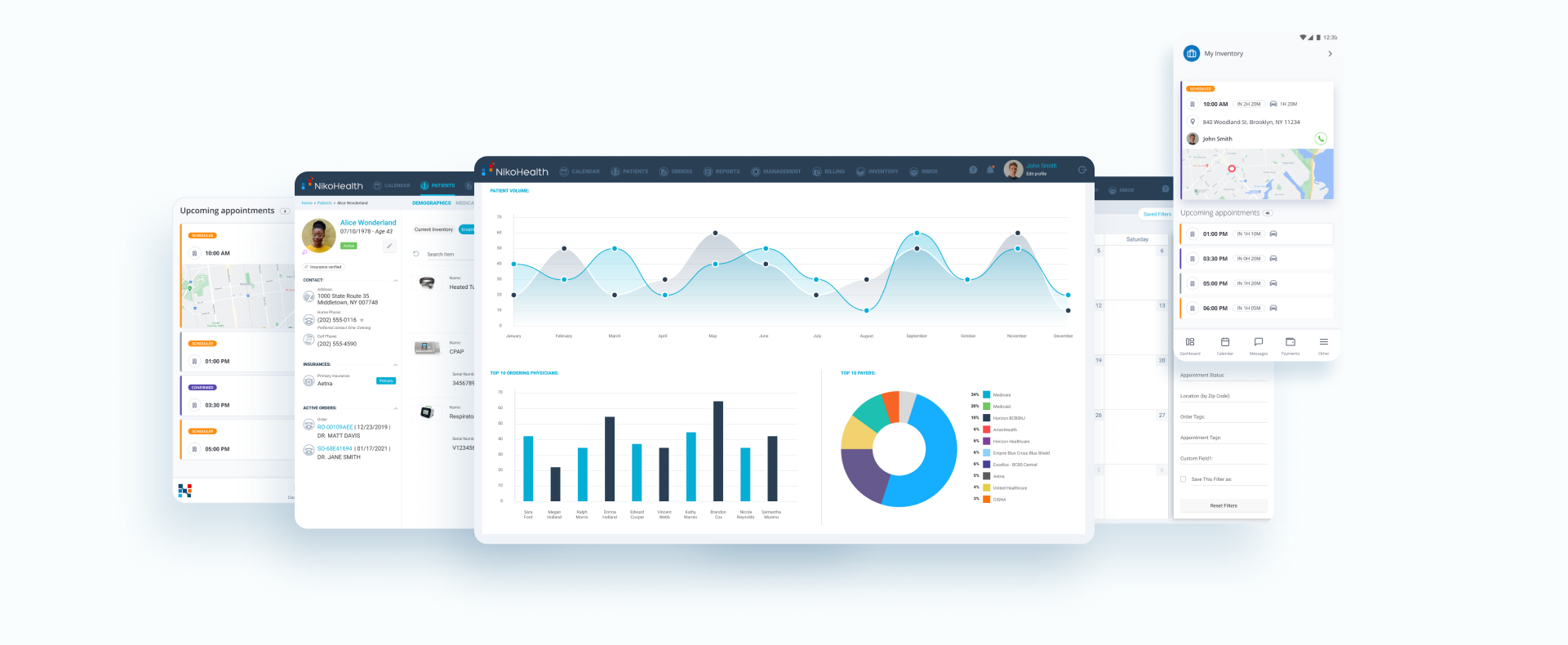
HME | DME Software by NikoHealth
A cutting-edge all-in-one cloud-based home medical equipment business process automation software.
0 likes · 0 comments
HealthMichael Victorius
2 years ago
medical billing software
Medical billing software plays a crucial role in the efficient management of healthcare services and streamlining the complex process of medical billing and claims processing. One notable solution in this field is the software provided by NikoHealth, which offers a range of benefits to patient Electronic Medical Records (EMR) to Durable Medical Equipment (DME) businesses.
Efficiency and Accuracy: Medical billing software, such as NikoHealth's offering, automates many tasks involved in the billing process. This automation reduces the likelihood of human errors and ensures that billing information is accurate. It can handle various billing codes, claim submissions, and reimbursement calculations, making the entire process smoother and more efficient.
Cost Savings: Implementing a robust medical billing software system can lead to significant cost savings. By automating manual tasks, healthcare providers can allocate resources more effectively and reduce the need for additional administrative staff. This, in turn, can lead to higher profitability for DME businesses.
Faster Reimbursements: One of the challenges in the healthcare industry is the time it takes to receive reimbursements from insurance companies. Medical billing software expedites the claim submission and processing cycle, leading to faster reimbursements for services provided. This improved cash flow is vital for sustaining healthcare operations.
Compliance and Security: NikoHealth's software, as an example, often includes features to ensure compliance with relevant healthcare regulations such as HIPAA (Health Insurance Portability and Accountability Act). This helps to safeguard patient data and maintain the privacy and security of sensitive medical information.
Integration with EMR: The integration of medical billing software with Electronic Medical Records (EMR) systems enhances the overall efficiency of healthcare practices. Seamless data flow between EMR and billing systems minimizes data entry duplication, reduces errors, and allows for a more comprehensive patient overview.
Data Analytics and Insights: Advanced medical billing software solutions offer data analytics capabilities that provide valuable insights into the financial health of a healthcare practice. Providers can identify trends, track performance metrics, and optimize their billing strategies based on data-driven decisions.
Improved Patient Experience: Efficient billing practices contribute to an improved patient experience. With accurate billing information and faster claims processing, patients are less likely to face billing disputes or delays in insurance coverage, leading to higher patient satisfaction.
In conclusion, medical billing software, exemplified by NikoHealth's offering (
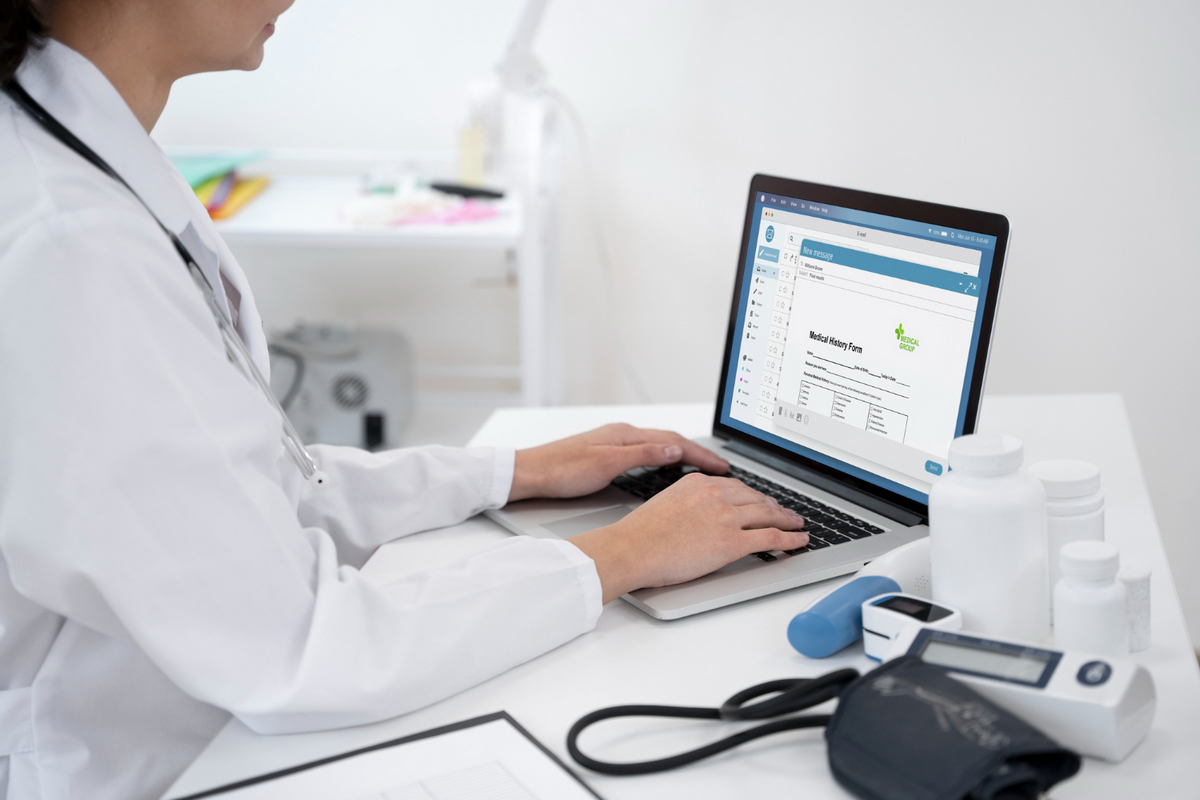
Benefits of Patient EMR to DME Businesses | NikoHealth
Patient EMR makes patient eligibility checks for DME suppliers easier. Learn more about your opportunities with NikoHealth.
https://nikohealth.com/benefits-of-patient-emr-to-dme-businesses/
0 likes · 0 comments
HealthMichael Victorius
2 years ago
patient emr
A Patient Electronic Medical Record (EMR) is a digitalized repository of a patient's medical history, treatment plans, and health-related information. This technology has revolutionized the healthcare industry by streamlining data management, improving patient care, and enhancing communication between healthcare providers. One noteworthy platform that highlights the benefits of Patient EMR, particularly for Durable Medical Equipment (DME) businesses, is NikoHealth (
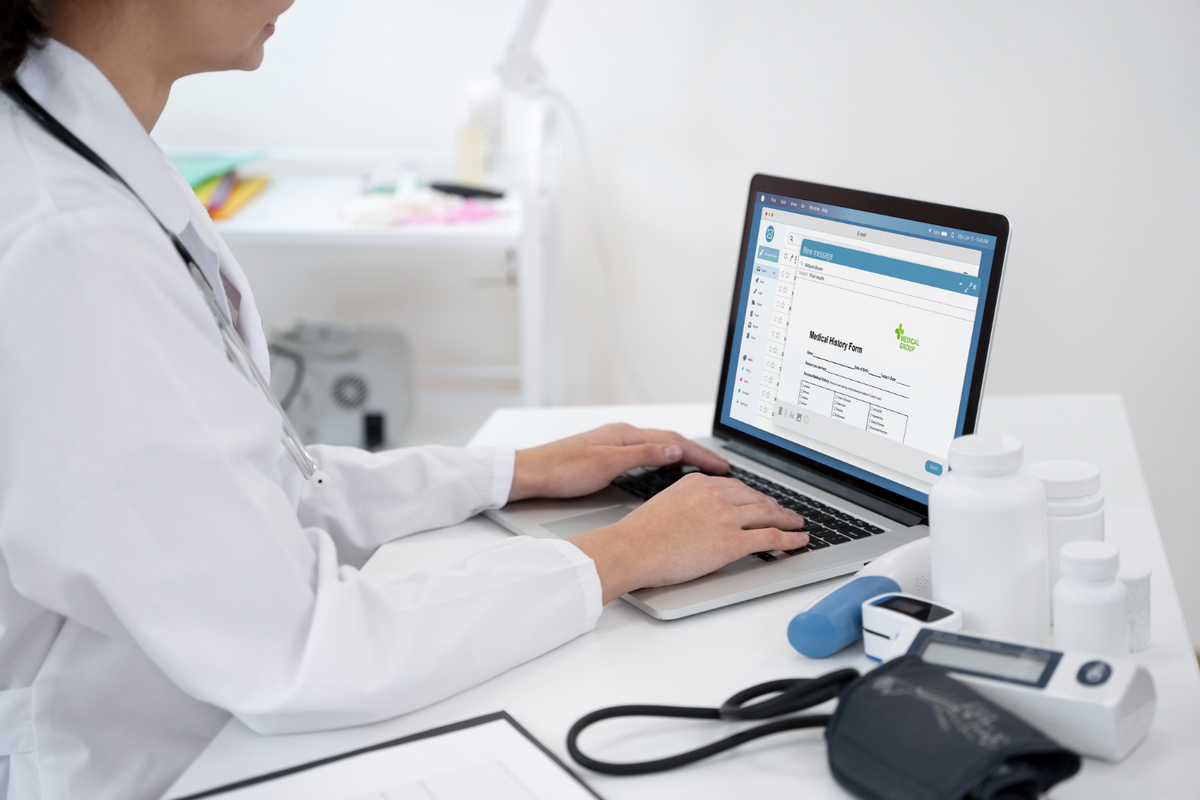
Benefits of Patient EMR to DME Businesses | NikoHealth
Patient EMR makes patient eligibility checks for DME suppliers easier. Learn more about your opportunities with NikoHealth.
https://nikohealth.com/benefits-of-patient-emr-to-dme-businesses/
Patient EMRs offer numerous advantages to DME businesses, which are enterprises focused on providing durable medical equipment like wheelchairs, oxygen tanks, and mobility aids. Here are some key benefits outlined in the mentioned resource:
Enhanced Efficiency: Digital EMRs eliminate the need for paper-based records, minimizing administrative tasks and reducing the chances of errors caused by manual data entry. This efficiency boost translates into streamlined workflows for DME businesses.
Accurate Ordering and Documentation: Patient EMRs enable healthcare providers to place accurate and informed equipment orders based on the patient's medical history and needs. This accuracy leads to more appropriate and effective solutions for patients, avoiding unnecessary equipment orders.
Improved Patient Care: Having access to comprehensive patient information through EMRs allows DME businesses to better understand the patient's medical background, enabling them to provide tailored equipment solutions that align with the patient's health conditions and preferences.
Faster Communication: EMRs facilitate seamless communication between healthcare providers and DME businesses. Quick access to patient data expedites the process of verifying prescriptions, insurance coverage, and other necessary information, leading to faster equipment delivery.
Data Security and Privacy: Digital EMRs offer advanced security features to protect sensitive patient information. With proper access controls and encryption, DME businesses can ensure compliance with data privacy regulations like HIPAA.
Inventory Management: Patient EMRs help DME businesses keep track of inventory more efficiently. By having a clear overview of equipment orders and usage, businesses can optimize their stock levels and reduce waste.
Billing Accuracy: Accurate and detailed patient information from EMRs aids in precise billing and claims submission. This reduces billing errors and delays in reimbursement for DME services.
Data Analytics: EMR data can be analyzed to identify trends, patient preferences, and areas for improvement. This data-driven approach allows DME businesses to enhance their services and stay competitive.
Incorporating Patient EMR systems, such as those showcased on platforms like NikoHealth, is a strategic move for DME businesses looking to streamline operations, enhance patient care, and remain at the forefront of the evolving healthcare landscape. The benefits of adopting EMRs extend beyond mere operational efficiency, contributing to improved patient outcomes and overall business success.
0 likes · 0 comments
HealthMichael Victorius
2 years ago
Streamlining Operations and Boosting Profits with Revenue Cycle Management Software
I wanted to share my recent experience with revenue cycle management software and how it has transformed my business operations. As a small business owner, I was constantly struggling with keeping track of invoices, payments, and overall financial health. That's when I decided to give revenue cycle management software a try, and I must say, it's been a game-changer!
With this software, I can now easily monitor every aspect of my revenue cycle, from sending out invoices to tracking payments and identifying any discrepancies. The automation features have saved me so much time, allowing me to focus on growing my business rather than getting bogged down in administrative tasks.
But the benefits don't stop there. By having a clear overview of my revenue cycle, I've been able to identify areas of improvement and optimize my processes. This has not only led to smoother operations but has also directly contributed to an increase in revenue. I've been able to reduce late payments and improve cash flow, which has had a positive impact on my bottom line.
The software's reporting capabilities have been invaluable in making informed decisions. I can analyze trends, identify patterns, and make strategic adjustments to further enhance my financial performance. Plus, the user-friendly interface has made the whole experience seamless, even for someone like me who isn't a tech expert.
I know that as business owners, we're always on the lookout for ways to maximize efficiency and profitability. Based on my experience, I highly recommend exploring revenue cycle management software if you haven't already. It's been a true asset to my business, and I believe it can make a positive difference for yours too.
If you have any questions about my experience or would like to know more about how revenue cycle management software works, feel free to ask. Let's continue supporting each other in our journey to success! More
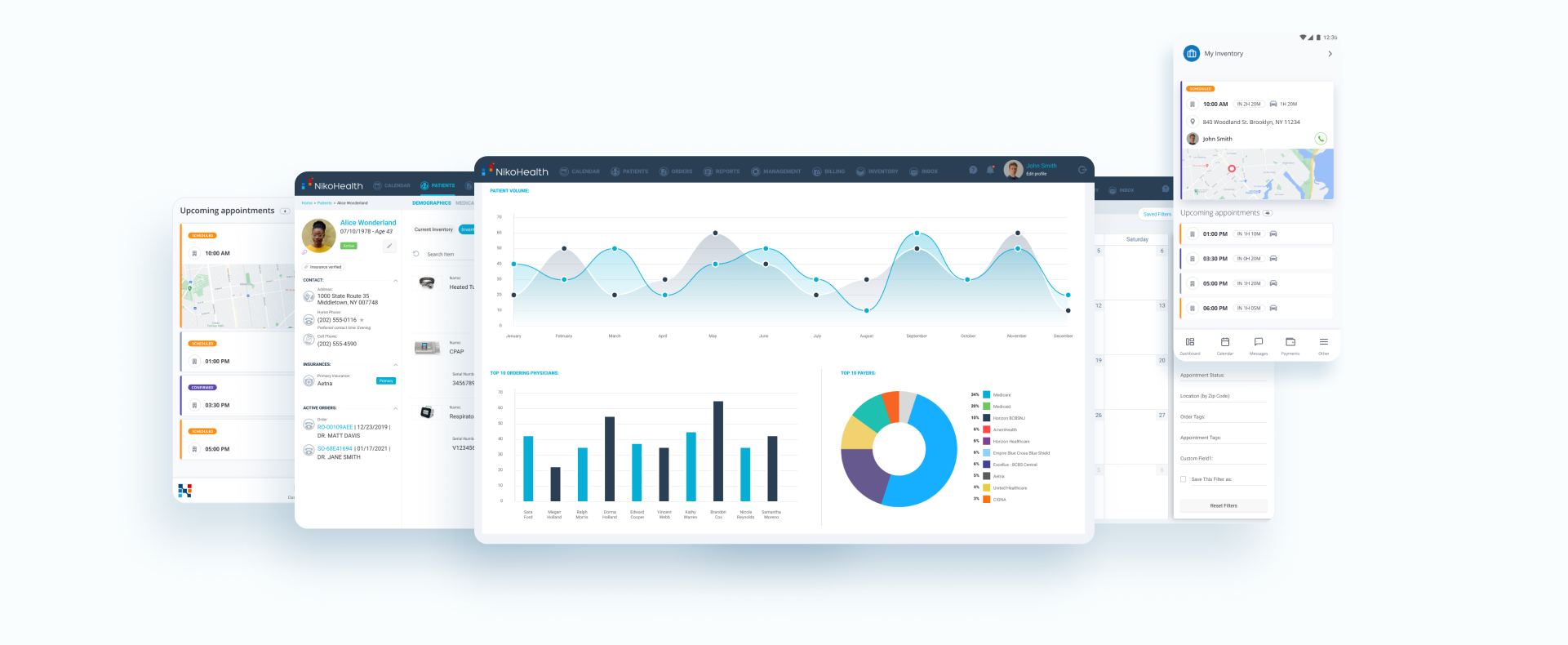
RCM Software | Revenue Cycle Management by NikoHealth
Streamline your revenue cycle management with a complete set of tools and functionalities needed to run a successful HME/DME business.
0 likes · 0 comments
HealthMichael Victorius
2 years ago
Streamlining Medical Billing with Cutting-Edge Software
Hey fellow healthcare professionals,
I just had to share my recent experience with medical billing software that has completely transformed my practice. As a busy medical practitioner, managing billing and administrative tasks used to be a real headache. But ever since I started using advanced medical billing software, everything has become so much smoother and efficient.
This software has not only simplified the billing process but has also significantly reduced the chances of errors. It seamlessly integrates with electronic health records, making it a breeze to generate accurate invoices and claims. The real-time tracking feature ensures that I'm always up-to-date with the status of my submissions.
What's even more impressive is the analytics and reporting capabilities of the software. It provides insightful data on revenue trends, payment cycles, and outstanding balances, helping me make informed decisions for my practice's financial health.
And the best part? The software's user-friendly interface requires minimal training, and their customer support is top-notch. Whenever I've had a question or needed assistance, their team has been quick to respond and incredibly helpful.
If you're looking to simplify your medical billing processes and optimize your practice's financial management, I highly recommend giving this software a try. It has truly been a game-changer for me, and I'm sure it can do wonders for your practice too. More
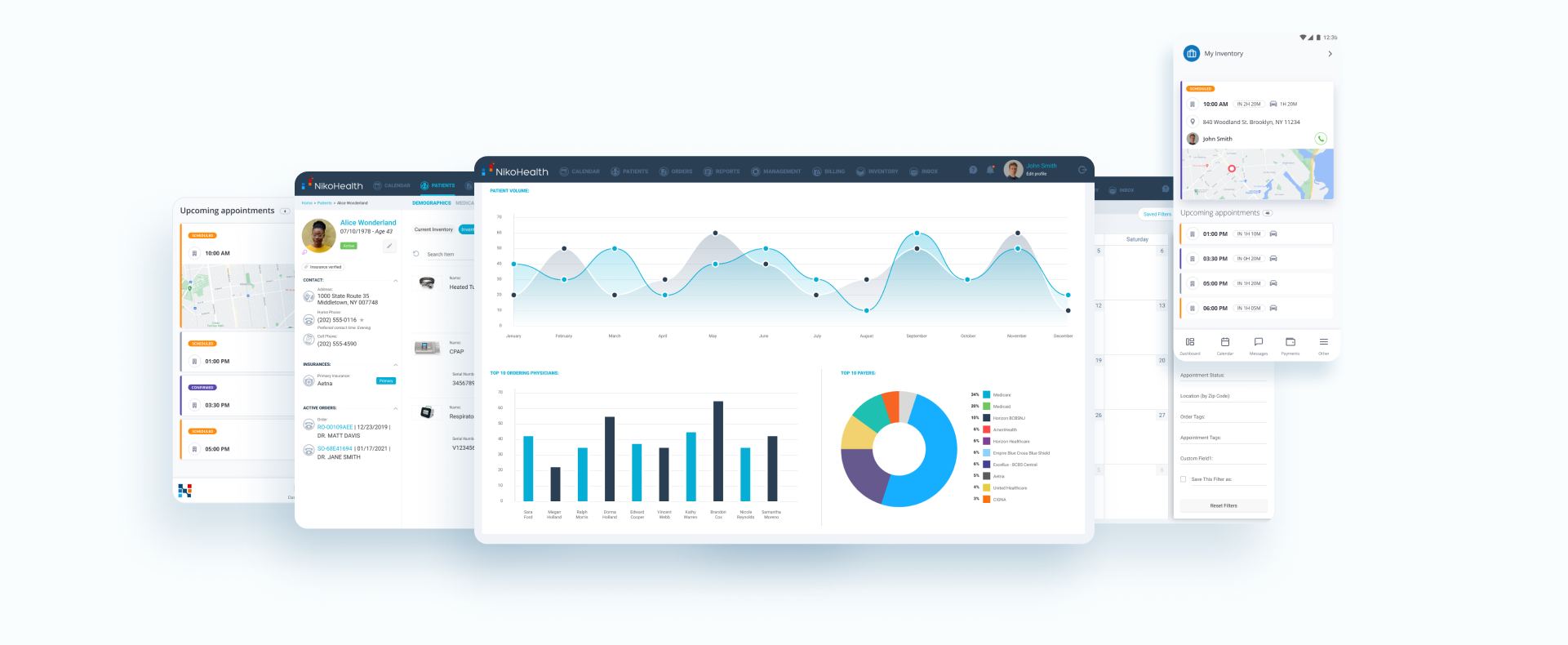
HME/DME Billing Software by NikoHealth
Supercharge your revenue cycle management within an all-in-one HME/DME business solution.
0 likes · 0 comments
HealthMichael Victorius
2 years ago
dme billing
DME Billing, or Durable Medical Equipment Billing, is a crucial process within the healthcare industry that involves the submission and processing of claims for durable medical equipment and supplies provided to patients. Durable medical equipment refers to items such as wheelchairs, hospital beds, oxygen equipment, prosthetics, and other medical devices that are used for therapeutic or diagnostic purposes and are intended to withstand repeated use.
The DME billing process is complex and involves several steps to ensure that healthcare providers are appropriately reimbursed for the durable medical equipment and supplies they provide to patients. Here's an overview of the DME billing process:
Patient Information and Verification: The process begins with collecting accurate patient information, insurance details, and verifying eligibility for the medical equipment or supplies. This step ensures that the patient's insurance coverage is active and covers the prescribed equipment.
Prescription and Documentation: A qualified healthcare professional must provide a prescription or order for the durable medical equipment. This prescription should include specific details about the equipment, its intended use, and the medical necessity for its use. Accurate documentation is crucial to support the claim submission.
Coding and Claim Creation: DME items are assigned specific HCPCS (Healthcare Common Procedure Coding System) codes that accurately describe the equipment or supply. These codes are used to create claims that are submitted to the patient's insurance company or payer for reimbursement.
Claim Submission: The created claims are submitted electronically or via paper to the appropriate insurance company or payer. The claims include all relevant information such as patient details, provider information, HCPCS codes, diagnosis codes, and supporting documentation.
Adjudication and Payment: The insurance company reviews the submitted claim for accuracy and medical necessity. If the claim is approved, the insurance company processes the payment to the healthcare provider. In some cases, the claim may be denied, requiring the provider to review and resubmit with additional information if necessary.
Denial Management and Appeals: If a claim is denied, the healthcare provider may need to engage in denial management and appeals processes. This involves identifying the reason for the denial, gathering additional documentation, and submitting an appeal to the insurance company for reconsideration.
To streamline and manage the DME billing process efficiently, healthcare organizations often rely on specialized software solutions. One such software is offered by NikoHealth, as mentioned in your request. NikoHealth provides HME/DME billing software that helps healthcare providers manage the entire billing cycle, from claim creation to submission and payment reconciliation. This type of software automates many aspects of the billing process, reduces errors, improves accuracy, and ultimately accelerates reimbursement for DME services.
In conclusion, DME billing is a critical aspect of the healthcare industry that ensures healthcare providers are appropriately reimbursed for providing durable medical equipment and supplies to patients. The process involves multiple steps, accurate documentation, and adherence to coding standards. Utilizing specialized software solutions like the one offered by NikoHealth (
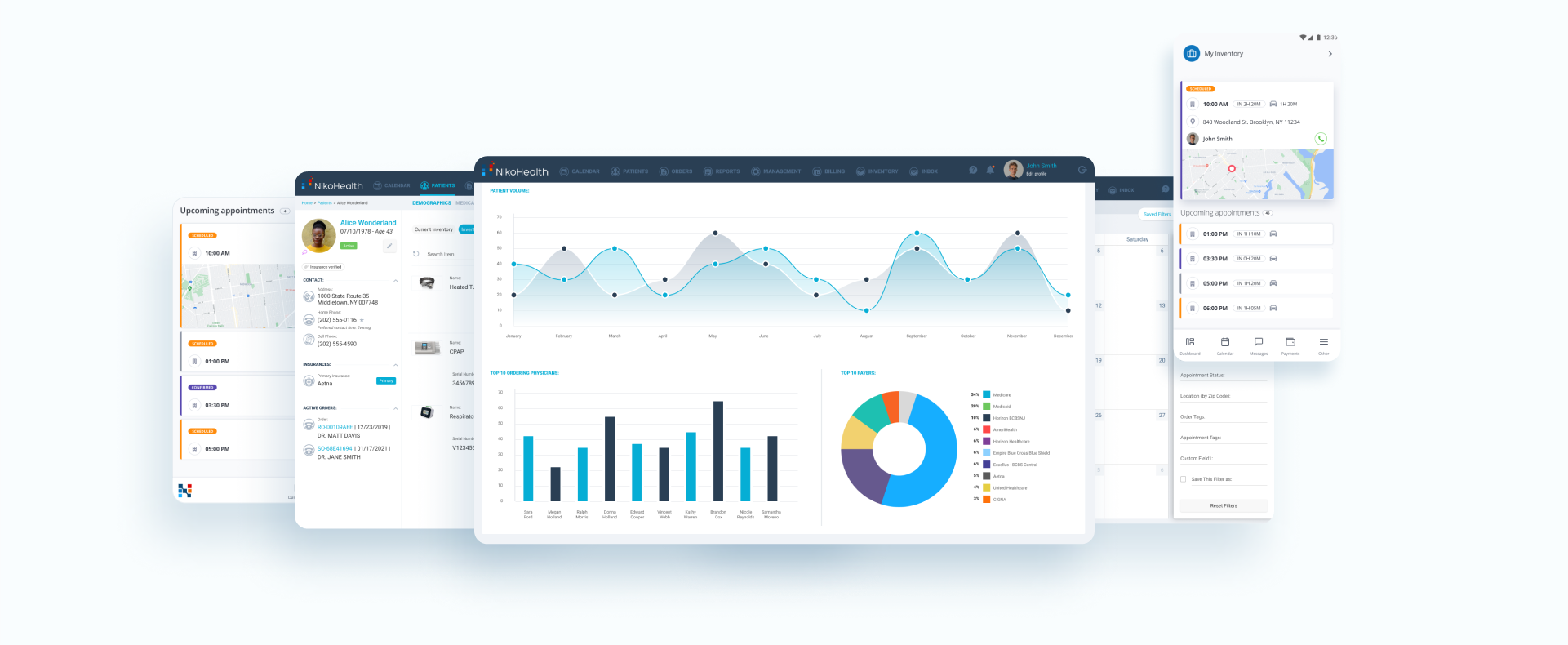
HME/DME Billing Software by NikoHealth
Supercharge your revenue cycle management within an all-in-one HME/DME business solution.
0 likes · 0 comments
Science and TechnologyMichael Victorius
2 years ago
home medical equipment software
Home Medical Equipment (HME) software plays a crucial role in the efficient management and operation of various medical equipment used within a home healthcare setting. This software streamlines the processes involved in providing, tracking, and maintaining medical equipment to ensure that patients receive the best care possible in the comfort of their own homes.
One notable player in the field of HME software is NikoHealth (
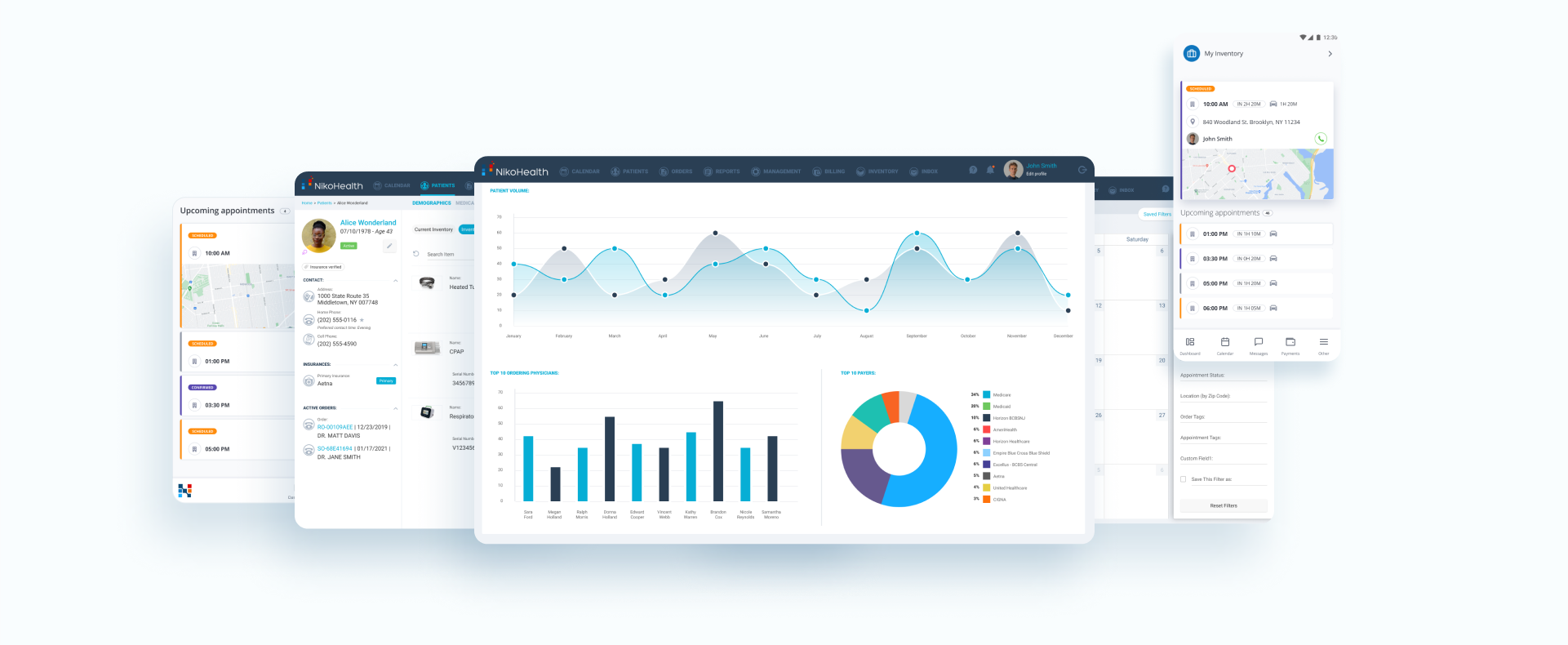
HME | DME Software by NikoHealth
A cutting-edge all-in-one cloud-based home medical equipment business process automation software.
Key features of home medical equipment software, such as NikoHealth, include:
Inventory Management: HME software helps healthcare providers keep track of their inventory, ensuring that the right equipment is available when needed. This reduces the risk of equipment shortages and helps in efficient allocation of resources.
Patient Scheduling and Tracking: The software allows healthcare professionals to schedule equipment deliveries, pickups, and maintenance based on patient needs. It ensures timely service and prevents any disruptions in patient care.
Billing and Claims Management: Home medical equipment software simplifies the billing process by automating invoicing, insurance claims, and reimbursement procedures. This reduces administrative burden and minimizes billing errors.
Patient Portals: Many HME software solutions, like NikoHealth, provide patient portals that allow patients and their caregivers to access information about their prescribed equipment, usage instructions, maintenance schedules, and more. This fosters greater patient engagement and empowers patients to take an active role in their care.
Data Security and Compliance: HME software systems prioritize data security and compliance with healthcare regulations to protect sensitive patient information and ensure legal adherence.
Reporting and Analytics: Advanced software solutions offer reporting and analytics tools that provide insights into equipment utilization, maintenance patterns, and other valuable data. This information enables healthcare providers to make informed decisions to optimize their services.
Interoperability: Integration capabilities with electronic health records (EHR) systems and other healthcare software enhance the seamless flow of patient information and improve care coordination.
Mobile Accessibility: Many HME software platforms offer mobile applications, allowing healthcare providers to manage equipment and patient information on-the-go, further enhancing efficiency and accessibility.
In conclusion, home medical equipment software, exemplified by solutions like NikoHealth, plays a vital role in enhancing the management and delivery of medical equipment in home healthcare settings. These innovative platforms contribute to improved patient care, streamlined operations, and better overall outcomes for both patients and healthcare providers.
0 likes · 0 comments
HealthDo you want to manage your own group?


